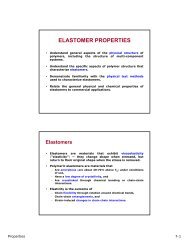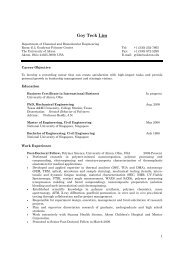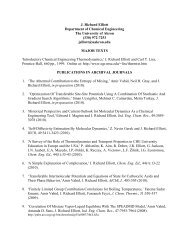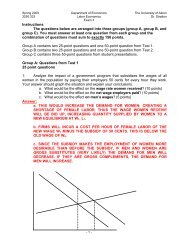Sociology of the Anarchists - Gozips.uakron.edu - The University of ...
Sociology of the Anarchists - Gozips.uakron.edu - The University of ...
Sociology of the Anarchists - Gozips.uakron.edu - The University of ...
Create successful ePaper yourself
Turn your PDF publications into a flip-book with our unique Google optimized e-Paper software.
my own attitudes that we should not pretend we are “neutral” or “unbiased” about <strong>the</strong><br />
issues <strong>of</strong> <strong>the</strong> day. Sure, we should be fair and respectful in considering our students’<br />
values, beliefs, and opinions. But, to pretend we ourselves do not have any is absurd, and<br />
I think removes credibility from our presence. I think <strong>of</strong> Howard Zinn's excellent<br />
autobiography called You Can't Be Neutral On A Moving Train (1995), which is <strong>the</strong><br />
statement he would use at <strong>the</strong> beginning <strong>of</strong> all his history classes at Boston <strong>University</strong>. To<br />
inspire students to use <strong>the</strong> things <strong>the</strong>y learn (whe<strong>the</strong>r from us teachers or from<br />
<strong>the</strong>mselves) is what higher <strong>edu</strong>cation should be about; it ain’t a diploma factory (or at<br />
least, that’s not its best utility). <strong>The</strong> passion we display in class is important to show<br />
students that action is possible. For me, this last point is very important; as an activist I<br />
am constantly confronted by <strong>the</strong> need to be critical <strong>of</strong> <strong>the</strong> dominant institutions <strong>of</strong> society<br />
and <strong>the</strong> horror <strong>the</strong>y frequently wreck upon humanity and <strong>the</strong> earth, but at <strong>the</strong> same time to<br />
remain positive about <strong>the</strong> ability for people to organize <strong>the</strong>mselves in a way that allows<br />
for both resistance to <strong>the</strong>se problems and for <strong>the</strong> creation <strong>of</strong> more positive ways <strong>of</strong><br />
organizing society. <strong>The</strong>ir article brought this point out well, in my opinion.<br />
Preparing for class:<br />
Some <strong>of</strong> McKeachie's (2002) suggestions seem useful and appropriate. I particularly<br />
appreciate things that encourage greater student participation in <strong>the</strong> process <strong>of</strong> learning—<br />
and somehow he managed to mention two suggestions linked in with pre-course<br />
planning. First, <strong>the</strong> idea <strong>of</strong> democratically selecting a textbook never dawned on me, but<br />
it's a fascinating idea! For some reason we (<strong>the</strong> well/over-<strong>edu</strong>cated few) seem to think<br />
we've got <strong>the</strong> best humdinger <strong>of</strong> a book/assignment/whatever in mind, and don't <strong>of</strong>ten<br />
consider consulting with those who will be reading or doing that task. Not sure how it<br />
would work in practice, but I'd be intrigued by <strong>the</strong> process. I suspect-- and it's been my<br />
experience with non-academic, activist work-- that people generate more enthusiasm<br />
about things when <strong>the</strong>y have an active role in determining <strong>the</strong> outcomes <strong>of</strong> a certain group<br />
(or in this case, a class).<br />
Secondly, I appreciate <strong>the</strong> suggestion McKeachie made (almost in passing) that we try to<br />
create alternative assignments (or at least alternative readings) that will allow students to<br />
pursue <strong>the</strong>ir interests more closely. My experience very much matches his thought that<br />
“students who have options and a sense <strong>of</strong> personal control are likely to be more highly<br />
motivated for learning.” (p.17) <strong>The</strong> clearest example <strong>of</strong> this is where instructors give<br />
students <strong>the</strong> choice on a variety <strong>of</strong> topics to do a report on, opposed to assigning everyone<br />
to do it on <strong>the</strong> same damn thing. Sure, a homogeneous assignment might make it easier to<br />
grade, but it doesn't allow students to pursue <strong>the</strong>ir particular interests in a subject, nor<br />
empower <strong>the</strong>m a sense <strong>of</strong> ownership over <strong>the</strong>ir learning processes.<br />
First day <strong>of</strong> class:<br />
I appreciate McKeachie's suggestions about <strong>the</strong> first day <strong>of</strong> class, and how it makes sense<br />
to use <strong>the</strong> time productively. It's a great chance to deal with non-content stuff like getting<br />
to know <strong>the</strong> class, <strong>the</strong>ir expectations, develop some trust, etc. Although I sometimes<br />
dreaded it, instructors who kept my classes longer on <strong>the</strong> first day <strong>of</strong> class actually helped<br />
to calm me about <strong>the</strong> course and its expectations. When everyone is kicked out after 15<br />
[ Williams 97 ] [ this is a draft. do not cite. ]






